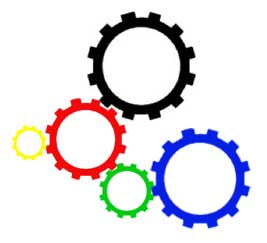Eight years ago, blogger Heather Clarkson authored an article reprinted on Petful that perfectly highlighted some of the pitfalls of networking on social media. I'd urge anyone who shares animals in need, even occasionally, to check it out. I think it's just as timely in 2022 as it was in 2014.
One Crossposter/Networker's Journey
I'll start with an important caveat: my presence on Facebook isn't completely confined to crossposting/networking. It's an excellent way to stay in touch with friends and family. There are groups people have started for virtually everything you can imagine. You can also do things to reach a business customer base easily.
One of the things I found helpful early on was joining groups and liking/following pages for rescue crossposting. None of us will succeed in saving every death-row dog out there. However, networking on social media helps give them somewhat of a chance.
Somewhere along the way, I started one page that led to several others geared toward rescue crossposting. However, going this route is not without pitfalls:
- Many crossposters assume that such pages have someone staffing them around the clock - not so when you have job and family commitments
- An extended hospital stay could leave your page unattended if you haven't already prepared for this situation
- Groups affiliated with your page can be a challenge in the absence of admins ready to help out
What, then, can we do? I think it’s time to change the narrative so that more people see crossposting as an important PART of the solution instead of the ENTIRETY of the solution.
Crossposting on Social Media Has Limitations
Regardless of whether you crosspost using a personal profile or groups, or pages on Facebook, there are some limitations. Here are some of the biggest to consider.
Posting Restrictions Can Be a Drag
People who crosspost often get tagged on multiple posts a day or receive messages about multiple death row pets on a daily basis. In many cases, you can only share the same posts with so many groups before your account gets restricted (i.e., “FB Jail”).
When you land yourself in FB Jail, you’re not going to be able to keep sharing without risking having your account restrictions extended further. Even FB group admins or page owners are not completely exempt from being “jailed.”
What it boils down to is even if you’re a group or page admin, you don’t own the infrastructure where everything is hosted. Unless the powers that be change their algorithms to stop treating rescue crossposts as spam, this is going to be a continual issue.
Unhelpful Comments
Sometimes it seems like every legitimate help offer or suggestion ends up being counterbalanced with comments that cause a lot of needless drama. It would help if those who are commenting only to say they can’t do anything would keep it to themselves, or those who want to flame the pound workers would give it a rest.
However, even addressing these types of comments can cause further drama and malcontent. It takes away from the legitimate efforts to help these animals and makes it harder for volunteers to sort through real helpful offers.
What it boils down to is that the people who work in high-kill facilities aren’t the ones who are usually reading the comments begging them to “stop the killing/stop murdering animals,” etc. These types of comments only clutter up the threads and make it harder for rescue volunteers who have no involvement with the killing decisions to find out who’s really trying to help.
Also, a helpful hint: there are people who won’t use any type of social media site or will only use one platform. These Internet users shouldn’t be “exiled” from helping because they opt not to get involved with social media.
People Legitimately Interested in Helping Need to Spring Into Action
People legitimately interested in helping, instead of inciting drama, would do well to educate themselves on the reasons shelters kill often-healthy, adoptable animals. In short, these “reasons” are the product of a system that is not intended for adoption in the first place, and legislative action is necessary to change things so that municipal shelters go from impound facilities that are permitted to “dispose” of unclaimed animals in lethal ways to city/county-run shelters focused on adoption for unclaimed animals.
To see these “kill” facilities transform into adoption facilities, there needs to be more community involvement and support for rescues that step in to “pull” the animals to safety.
Pound Animals Need More Exposure
Pound animals need to be highlighted across all social media platforms, not just FB. A bonus that would be particularly helpful would be if the cities or counties that run municipal facilities had listings on business social networking sites like LinkedIn or Alignable.
Crossposters could help increase the chances of animals getting rescued by reaching out to rescues themselves to make them aware of animals they can pull. One thing that may help is if crossposters that contact rescues offer to help in some way they legitimately can, like transporting, fostering, or helping to raise funds.
If you’re a writer with journalism experience, find sites to write for that would allow you to cover local animal rescue issues. You may also want to alert local reporters to issues going on at your pound or in rescues that require attention.
Rescues Need Funds
A common, wrong assumption is that pledges are a type of ransom paid to municipal shelters to prevent an animal from being killed. This idea is not only incorrect but is hurtful to rescue efforts when too many people believe it.
Pledges are for no-kill rescues who might pull the animal, NOT for the pounds, which are government-funded and do not receive donations. Well-intentioned but misinformed people who proclaim that they won’t support kill shelters by refusing to help fund rescues are, in fact, only hurting the animals.
Pledges paid to rescues help provide often-needed funds to provide initial vetting and other care. No organization has unlimited funds at its disposal, so every bit of funding raised helps.
Rescues Need Fosters and Other Volunteers
Rescues, rather than operating shelters, require fosters to provide temporary homes for animals in their care. A foster can make all the difference in whether an animal gets out of the pound alive.
Transporters can also help when animals are pulled by out-of-area rescues. One of the helpful things about volunteering to provide transportation is that you can transport the animal all the way to the destination or take a “leg” of the trip as part of a group effort.
Rescues can also use volunteers at adoption events. Every role that a volunteer plays is vital in getting municipal shelter animals to safety.
As influential as crossposting can be in saving animals’ lives, we can and must do better. If we realize that crossposting is one part of the solution, not an entire solution in and of itself, we may save more lives than ever before.




